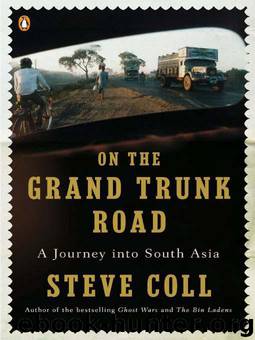On the Grand Trunk Road by Steve Coll

Author:Steve Coll
Language: eng
Format: mobi, epub
Tags: Autobiography
ISBN: 9780143115199
Publisher: Penguin
Published: 1994-01-02T00:00:00+00:00
Organized, state-sponsored political murder is practiced regularly and on a significant scale in South Asia today not only in Sri Lanka but in the disputed Indian states of Punjab and Kashmir. Government counterinsurgency campaigns also persist in the Indian northeast, in Pakistan’s Sind Province, in the hills of Bangladesh, and in other areas. At the moment, most of these other counterinsurgency programs are in various states of remission.
In Punjab and Kashmir several thousand people die annually in low-intensity wars of insurgency fought between Indian security forces—police, paramilitary troops, and regular army soldiers—and a fractured array of dozens of separatist, religious, and revolutionary guerrilla groups. In Punjab, guerrillas claiming to represent the state’s ethnic and religious Sikh majority are attempting achieve total independence from New Delhi. In Kashmir, guerrillas claiming to represent the state’s Muslim majority also seek total independence from New Delhi. The Indian government, arguing that neither guerrilla movement represents the popular will and that in any case secession of any part of the Indian union is unacceptable, has suspended most of its civil and criminal legal code and deployed hundreds of thousands of troops to defeat the guerrillas with force.
In Punjab, this years-long counterinsurgency campaign has been accompanied by sporadic but unsuccessful attempts at political negotiation with the separatists. In Kashmir, the government does not yet feel that the “situation on the ground,” as Indian officials refer to it, has “ripened” sufficiently to warrant meaningful political initiative. This process of ripening involves an attempt to weaken the guerrilla groups—which are not as unified or as committed as Wijeweera’s Liberation Front was in Sri Lanka—with unbridled force. A substantial number of the annual victims of violence, perhaps several hundred in Kashmir and as many as one thousand or more in Punjab, are young men suspected of being insurgents, who are arrested and murdered in custody by Indian security forces.
After an extensive investigation in Punjab during 1989 and 1990, the human rights group Asia Watch concluded that these killings “are not aberrations but rather the product of a deliberate policy known to high-ranking security personnel and members of the civil administrations in Punjab and New Delhi. Moreover, there is credible evidence to indicate that, in some cases, the police have actually recruited and trained extrajudicial forces to carry out many of these killings.” In other words, death squads. Everything I saw and heard during half a dozen visits to besieged Kashmir suggested the same was true there as well. In both places, however, death squads operate on a considerably lesser scale than they did in 1989 and 1990 in southern Sri Lanka.
The political heirs to Jawaharlal Nehru and Mohandas Gandhi have a much tougher time coping with the political morality of their death squads than Premadasa had in Sri Lanka. India’s international credibility depends on its self-image as a humane, even spiritual, democracy. Confronted with evidence about state-sponsored murder in the half-empty chambers of the United Nations Human Rights Commission in Geneva or the General Assembly in New York, Indian
Download
This site does not store any files on its server. We only index and link to content provided by other sites. Please contact the content providers to delete copyright contents if any and email us, we'll remove relevant links or contents immediately.
China Rich Girlfriend by Kwan Kevin(4557)
The Silk Roads by Peter Frankopan(4525)
Annapurna by Maurice Herzog(3463)
Full Circle by Michael Palin(3443)
Hot Thai Kitchen by Pailin Chongchitnant(3376)
Okonomiyaki: Japanese Comfort Food by Saito Yoshio(2707)
The Ogre by Doug Scott(2678)
City of Djinns: a year in Delhi by William Dalrymple(2546)
Photographic Guide to the Birds of Indonesia by Strange Morten;(2526)
Vietnam, Cambodia, Laos & Northern Thailand by Lonely Planet(2440)
Tokyo by Rob Goss(2425)
Tokyo Geek's Guide: Manga, Anime, Gaming, Cosplay, Toys, Idols & More - The Ultimate Guide to Japan's Otaku Culture by Simone Gianni(2359)
Everest the Cruel Way by Joe Tasker(2336)
Discover China Travel Guide by Lonely Planet(2219)
Iranian Rappers And Persian Porn by Maslin Jamie(2189)
China (Lonely Planet, 11th Edition)(2158)
China Travel Guide by Lonely Planet(2145)
Lonely Planet China(2140)
Top 10 Dubai and Abu Dhabi by DK Travel(2089)
